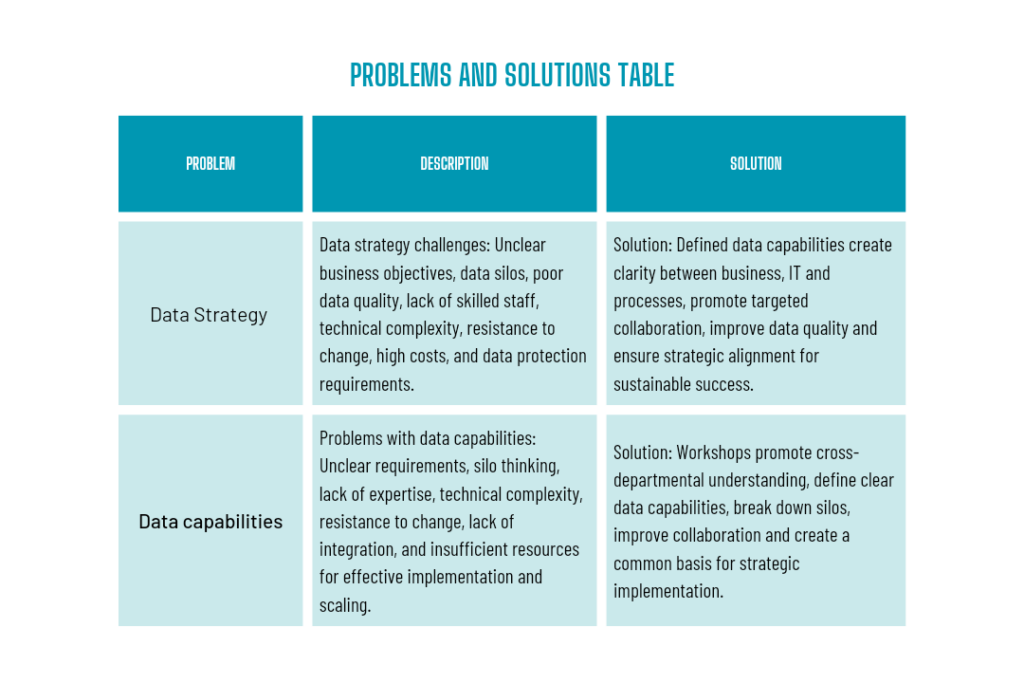
In an increasingly digitized business world, data is becoming an ever more valuable strategic asset. For modern companies, it is no longer sufficient to simply collect and store data. Rather, the ability to utilize this data and turn it into concrete business outcomes, along with the development of Data Capabilities – specific skills and resources for effective data management and usage – are critical success factors. Data Capabilities have become an indispensable pillar of corporate strategy, as they form the foundation for digital transformation and help companies gain competitive advantages and achieve long-term success.
Data Capabilities as Drivers of Digital Transformation
Digital transformation requires not only technological adjustments but also profound changes in business processes and structures. Data Capabilities play a central role in this, as they enable companies to use data specifically to optimize their processes and create new business models. Data Capabilities are very company-specific and can be, for example:
- Data Integration: The ability to combine and harmonize data from different sources allows companies to obtain a comprehensive view of their business activities and make informed decisions.
- Data Analysis and Visualization: The ability to analyze complex data sets and present the results in an understandable manner enables companies to gain valuable insights that directly feed into their business strategy.
- Data Quality Assurance: High data quality is crucial for the reliability of analyses and decisions. Companies must be able to continuously monitor and ensure the quality of their data.
- Data Access and Security: Controlled access to data and the protection of sensitive information are prerequisites for success in a digitalized world. Companies must ensure that their data is not only secure but also accessible to the right stakeholders.
Data Governance and a Data-Driven Corporate Culture as the Foundation
The successful implementation of Data Capabilities requires robust Data Governance. Data Governance ensures that data is managed correctly, consistently, and in compliance with legal regulations. It creates clear guidelines and processes for handling data and defines responsibilities within the company. Well-implemented Data Governance forms the foundation for scaling Data Capabilities and simultaneously fosters a data-driven corporate culture.
Such a culture is characterized by transparency, accountability, and an open attitude toward data. Leaders must actively promote this culture by offering training to enhance their employees’ data literacy and ensuring that data-driven decisions are made at all levels of the organization.
Concrete Example: Data Availability as a Data Capability in Practice
A globally operating logistics company successfully implemented the Data Capability Data Availability, supported by clear Data Governance guidelines. To increase data availability, the company introduced a financial penalty for customers who did not provide shipment data or provided it insufficiently. This measure motivated customers to deliver complete and high-quality data. As a result, process costs decreased significantly, as the company could now rely on more comprehensive and reliable data. Missing or low-quality data was also better managed through appropriate regulations, further optimizing the entire data management process.
Recommendations for Integrating Data Capabilities
- Strategic Integration: Integrate Data Capabilities into your corporate strategy by defining clear goals and responsibilities.
- Gradual Implementation: Start with a program to introduce and scale your Data Capabilities to achieve targeted improvements.
- Continuous Adjustment: Regularly monitor the performance of your Data Capabilities and adapt them to changing business requirements.
- Promote a Data-Driven Culture: Ensure that all employees understand the importance of data and activelcompany-specific and can be, for exampley integrate it into their daily work.
By consistently implementing these recommendations, companies can ensure that their Data Capabilities contribute not only technically but also strategically to business success.